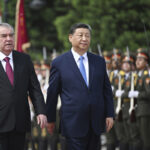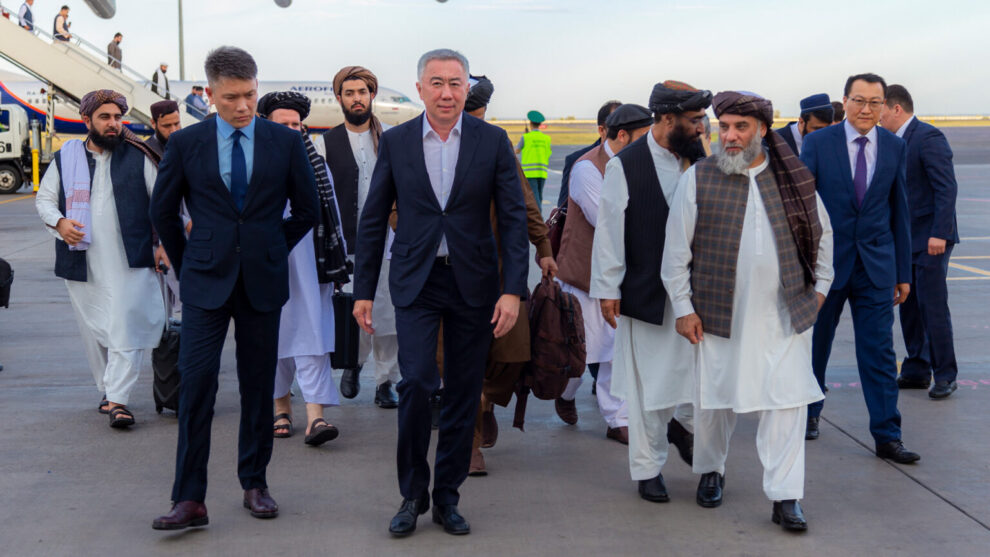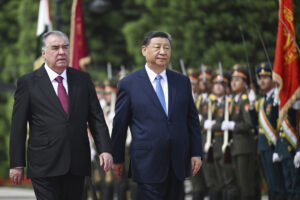ASTANA – Kazakh-Afghan Business Forum taking place on Aug. 3-5 in Astana is intended to strengthen trade and economic relations, providing opportunities for businesses across numerous sectors, including diversification of trade routes, said Kazakh officials at a press briefing on July 31.
Kazakh Deputy Minister of Foreign Affairs Kanat Tumysh and Vice-Minister of Trade and Integration of Kazakhstan Kairat Torebayev attended the briefing, highlighting that Kazakhstan is aiming for robust years of bilateral trade with Afghanistan, surpassing the $988 million reached last year, as the two nations continue to deepen trade ties.
About the forum
According to Torebayev, the forum will gather over 200 delegations headed by Nooruddin Azizi, Afghan Minister of Industry and Commerce.
“They are representatives of business, large energy and telecommunications companies, representatives of the Central Bank and a number of private banks, manufacturers of carpets, beverages, precious stones and many others,” he said.
“I would like to note right away that all members of the Afghan delegation are not included in the United Nations Security Council’s sanctions lists and, accordingly, no restrictive measures can be applied to them,” added Torebayev.
The forum is the result of growing mutual cooperation between the two sides following the Deputy Prime Minister and Minister of Trade and Integration of Kazakhstan Serik Zhumangarin’s visit to Kabul in April.
The delegation led by Zhumangarin announced the establishment of a Kazakh trade house in Afghanistan, with the main office in Herat. Its main goal is to promote and intensify bilateral relations in trade and economics, telecommunications, transportation, and logistics.
Overall, six trade and economic missions by Kazakh businesses were sent to Afghanistan since 2013 and the range of delivered goods expanded each time.
Tumysh stressed that the upcoming forum is aimed solely at developing bilateral trade, economic and investment ties.
Current trade turnovers with Afghanistan
“Afghanistan is one of the major importers of Kazakh agricultural products. Today, around 70% of the flour exported by Kazakhstan is purchased by Afghanistan. As a result, last year the trade turnover between Kazakhstan and Afghanistan amounted to $988 million and we intend not only to maintain this figure but also to increase it,” said Tumysh.
Kazakhstan aims to surpass that almost $1 billion in bilateral trade recorded last year, as it continues to pursue its $3 billion target in trade in the years to come, said Torebayev.
Flour accounted for the largest portion (70%) of Afghanistan’s imports from Kazakhstan last year and they are expected to continue rising.
“Last year, the volume of flour supply increased by 52% from 895,000 tons in 2021 to 1.3 million tons in 2022, wheat by 20% from 572,000 tons in 2021 to 687,000 tons in 2022, sunflower oil has increased 6.2 times from 2,825 tons in 2021 to 17,500 tons in 2022 and from this year, rye began to be shipped. The demand potential for these goods is huge,” added Torebayev.
Diversification of trade routes
Greater alignment on trade will improve competitiveness and provide opportunities for businesses across numerous sectors, according to Tumysh.
“Namely, [it will allow] for new transportation and logistics routes in the southern direction with access to the Pakistani market with a volume of approximately 220 million people, as well as through the Pakistani ports of Karachi and Gwadar to enter the markets of the Gulf and the Middle East,” said Tumysh.
Kazakh producers will gain export opportunities to Pakistan, India and the Persian Gulf countries. “These are new and very attractive trade markets for Kazakh exporters,” said Torebayev.
“We are now developing new trade routes to Pakistan via Afghanistan. We have reached an agreement with a major player in Pakistan’s transportation services market, National Logistics Cell. It is ready to provide safe and fast transit of goods from Pakistan to Kazakhstan via Afghanistan and back, which is only 4,000 kilometers. We have already successfully piloted the shipment of goods by this route in a fairly short time,” he added.
Kazakhstan is keen to ease export terms for producers through the rail network.
“In order to create attractive conditions for exporters, an agreement was reached on the provision of a 30% discount by the Turkmen side for the transit of cargoes through their territory in the direction of Afghanistan. At the same time, we have strengthened agreements with Uzbekistan to provide preferential conditions for transit rail transportation through the territories of our countries so that we could supply flour and grain to Afghanistan on a parity basis,” said Torebayev.
The vision laid out by Kazakhstan focuses on diversifying trade routes.
“Kazakhstan highly values the initiative to build the Mazar-i-Sharif-Kabul-Peshawar trans-Afghan transport corridor, which will ensure uninterrupted interregional cooperation between the countries of Central Asia and the countries of South Asia and the Middle East. This route will give a new impetus to the dynamics of trade and economic cooperation. Kazakhstan is ready to participate in its construction,” said Torebayev.
Other prospective sectors of cooperation
The energy sector is also on the agenda as one of the prospective areas of cooperation between the two countries.
“Kazakhstan is one of the largest oil and gas producers in the region and Afghanistan needs energy resources for its development. It is possible to implement projects on the production and transportation of energy carriers, which will allow both countries to strengthen their economies,” said Torebayev.
There could also be scope for securing cheaper imports from Afghanistan, particularly of fruits, vegetables, nuts and high-quality Afghan carpets.
Source : Astana Times















